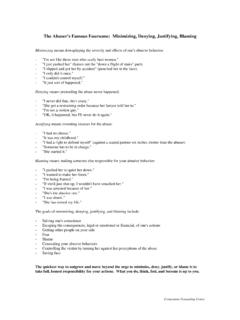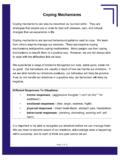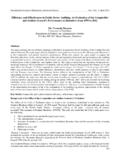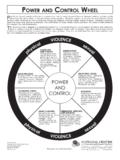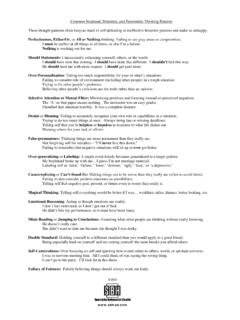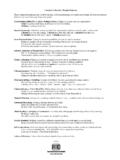Transcription of 15 Questions Answers About - Lake County Council on Aging
1 15 Questions & Answers About Elder Abuse NATIONAL CENTER ON ELDER ABUSE WASHINGTON, DC The National Center on Elder Abuse (NCEA) serves as a national resource for elder rights advocates, adult protective services professionals, law enforcement and legal professionals, medical and mental health providers, public policy leaders, researchers, and concerned citizens. It is the mission of NCEA to promote understanding, knowledge sharing, and action on elder abuse, neglect, and exploitation. National Center on Elder Abuse Partners National Association of State Units on Aging , Lead partner 1201 15th Street, NW, Suite 350 Washington, DC 20005 American Bar Association Commission on Law and Aging 740 15th Street, NW Washington, DC 20005 Clearinghouse on Abuse and Neglect of the Elderly University of Delaware Newark, DE 19716 National Adult Protective Services Association 1900 13th Street, Suite 303 Boulder, CO 80302 National Committee for the Prevention of Elder Abuse 1612 K Street, NW, Suite 400 Washington.
2 DC 20006 Acknowledgement This NCEA publication is made possible through support from the Administration on Aging , Department of Health and Human Services. Grant No. 90-AM-2792. Opinions or points of view expressed in this publication are those of the authors and do not necessarily reflect the views of the Administration on Aging . Single copies of this publication can be obtained from the National Center on Elder Abuse National Association of State Units on Aging , 1201 15th Street, NW, Suite 350, Washington, DC 20005, You can also download this publication directly from NCEA's Web site at National Association of State Units on Aging June 2005 15 Questions & Answers About Elder Abuse This Q&A booklet Answers some of the most commonly asked Questions About elder abuse: What is it?
3 What are the warning signs? Who is most at risk? Who are the abusers? Are there laws that protect seniors? What steps can people take to protect themselves? Elder abuse is a crime that can touch anyone. We strongly urge you to continue to educate yourself About the problem of elder abuse, share what you learn with others, report concerns, get involved in community prevention efforts, and make a long term commitment to reach out to those who are vulnerable. To learn more, we invite you visit our Web site at SARA ARAVANIS Director, National Center on Elder Abuse 3 Contents Foreword 3 1 What is elder abuse?
4 5 2 How can I tell if someone is being abusive? 5 3 What are the warning signs of elder abuse? 6 4 Who are the abusers? 7 5 Is everyone at risk? 8 6 What is elder self-neglect? 8 7 Are there laws against elder abuse? 8 8 How many are victims of elder abuse or neglect?
5 9 9 What should I do if I suspect elder abuse? 9 10 What should I expect when I call for help? 10 11 Who will investigate? 10 12 What is Adult Protective Services? 10 13 Is there anything people can do to reduce their risk of elder abuse? 11 14 What is being done to combat this problem? 12 15 What can I do to help? 12 4 1.
6 What is elder abuse? Elder abuse is any knowing, intended, or careless act that causes harm or serious risk of harm to an older person physically, mentally, emotionally, or financially. The term is quite broad and encompasses many different types of mistreatment: Physical abuse Use of force to threaten or physically injure a vulnerable elder. Emotional abuse Verbal attacks, threats, rejection, isolation, or belittling acts that cause or could cause mental anguish, pain, or distress to an elder. Sexual abuse Sexual contact that is forced, tricked, threatened, or otherwise coerced upon another person, including anyone who is unable to grant consent.
7 Exploitation Theft, fraud, misuse or neglect of authority, and use of undue influence as a lever to gain control over an older person s money or property. Neglect A caregiver s failure or refusal to provide for a vulnerable elder s safety, physical, or emotional needs. Abandonment Desertion of a frail or vulnerable elder by anyone with a duty of care. Self neglect An inability to understand the consequences of one s own actions or inaction, which leads to, or may lead to, harm or endangerment. 2. How can I tell if someone is being abusive? Unfortunately, abusers are not always easy to spot.
8 Adding to the problem, victims may not be physically or mentally able to report their abuse, or they may be isolated and too afraid or ashamed to tell someone. While there is no typical profile of an abuser, the following are some behavioral signs that may indicate problems: Abusing alcohol or other drugs Controlling elder s actions: whom they see and talk to, where they go Isolating elder from family and friends, which can increase dependence 5 on abuser Emotional/ financial dependency on elder, inability to be self sufficient Threatening to leave or send elder to a nursing home Appearing to be indifferent to elder, seeming apathetic or hostile minimizing an elder s injuries, blaming victim or others for the abuse, neglect, or exploitation Threatening to harm an elder s pet Calling elder names Previous criminal history Mental illness 3.
9 What are the warning signs of elder abuse? Elder abuse can take many forms. Here are some signs that there may be a problem: Slap marks, most pressure marks, and certain types of burns or blisters ( , cigarette burns) most likely should cause suspicion whatever the explanation. Explanations that don t seem to fit with the pattern of physical injury are also suspect. Withdrawal from normal activities, unexplained change in alertness, or other unusual behavior may signal emotional abuse or neglect. Bruises around the breasts or genital area and unexplained sexually transmitted diseases can occur from sexual abuse.
10 Sudden change in finances and accounts, altered wills and trusts, unusual bank withdrawals, checks written as loans or gifts, and loss of property may suggest elder exploitation. Untreated bedsores, need for medical or dental care, unclean clothing, poor hygiene, overgrown hair and nails, and unusual weight loss are signs of possible neglect. If you have concerns About someone, trust your instincts. Don t be afraid to ask Questions . Keep in mind that victims of elder abuse may be experiencing other problems and more than one type of abuse. 6 4. Who are the abusers? Hard as it is to believe, the great majority of abusers are family members, most often an adult child or spouse.
